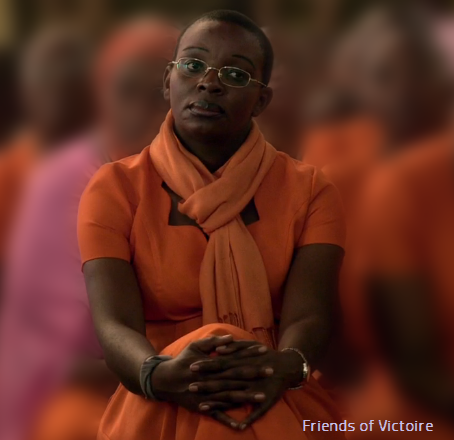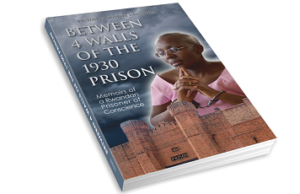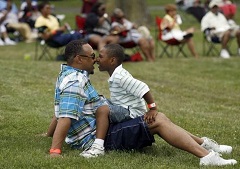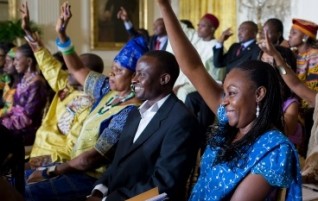 The arrest of opposition politician Victoire Ingabire after her return to Rwanda to contest the 2010 elections attracted widespread international attention. The criminal trial, one of the longest in Rwandan history, is both politically and legally important, as a test of the Rwandan judiciary’s capacity to deal with high-profile political cases fairly and independently.
The arrest of opposition politician Victoire Ingabire after her return to Rwanda to contest the 2010 elections attracted widespread international attention. The criminal trial, one of the longest in Rwandan history, is both politically and legally important, as a test of the Rwandan judiciary’s capacity to deal with high-profile political cases fairly and independently.
Victoire Ingabire, President of the United Democratic Forces (FDU-Inkingi), came to Rwanda in January 2010 to participate in the 2010 presidential elections. On 16 January 2010, her first day in the country after 16 years abroad, she made a speech at the Genocide Memorial Centre in the capital, Kigali, and laid a remembrance wreath. Her speech, which referred to problems with reconciliation and ethnic violence, addressed issues that are rarely discussed openly in Rwanda.
Victoire Ingabire was arrested in April 2010. She was bailed on house arrest and prevented from leaving Kigali. She was subsequently re-arrested on 14 October 2010 and was remanded in pre-trial detention. Four men, all reportedly former members of the Democratic Forces for the Liberation of Rwanda (FDLR),1 an armed group operating in eastern Democratic Republic of the Congo (DRC), were brought to trial alongside Victoire Ingabire as co-accused.
On 24th November 2017, the African Court on Human and Peoples’ Rights (AfCHPR) held that Rwanda violated Victoire Ingabire Umuhoza’s right to freedom of opinion and expression, as well as her right to an adequate defense. See AfCHPR, Ingabire Victoire Umuhoza v. The Republic of Rwanda, App. No. 003/2014, Judgment of 24 November 2017, paras. 173(viii)-(ix).
The court ruled that Rwanda had violated Ingabire’s right to various aspects of her defense and to freely express her opinions within the law. The judges found that Ingabire had not minimized the genocide against Tutsis and had not spread false rumors about the government, charges that were central to Ingabire’s conviction by Rwandan courts.
The AfCHPR found that the State violated Ingabire’s right to freedom of expression under Article 9(2) (right to freedom of expression) of the African Charter and Article 19 (right to freedom of expression) of the International Covenant on Civil and Political Rights (ICCPR) because the criminal conviction and sentence imposed on Ingabire for a speech that, the African Court found, did not minimize the genocide was a disproportional and unnecessary restriction on her freedom of speech. See id. at para. 173(ix). (Read more here)
Amnesty International report on Victoire Ingabire’s trial
Amnesty International appointed an independent trial monitor who was present for all but four days of the trial and compiled a detailed record of court proceedings. The organization considers that the trial fell short of complying with various fair trial standards:
“The trial was marred by the court’s failure to ensure that evidence was properly tested” –Sarah Jackson, Amnesty International’s Acting Deputy Africa Director Tue, 30/10/2012
Amnesty International observed almost the whole trial from September 2011 to April 2012. The organization’s focus was on the fairness of the proceedings and the court’s capacity to try the case in line with international standards. The charges against Victoire Ingabire fell into two broad categories – speech-related charges and terrorism-related charges. The prosecution alleged that Victoire Ingabire conspired with the four co-accused to form an armed group called the Coalition of Democratic Forces (CDF), and that her objective was to cause insecurity in Rwanda and force the government into peace talks by waging war. All four co-accused pleaded guilty, made confessions and requested reduced sentences for cooperating with the court.
In relation to the terrorism-related charges, the court failed to test evidence brought by the prosecution that was obtained after a period of prolonged incommunicado detention of the co-accused. Confessions of two co-accused incriminating Victoire Ingabire were made after a prolonged period of detention in Camp Kami, a military camp where Amnesty International has documented allegations of the use of torture to coerce confessions. One defence witness, or court informer, claimed he had been held in Camp Kami with one of the co-accused and alleged that the individual’s confession had been forced.
The speech-related charges were brought against Victoire Ingabire following the public expression of her political views. The prosecution alleged that as leader of various political groups in the diaspora, and after her return to Rwanda in 2010, she had uttered, published, wrote or made known to the public through print, radio or the internet, statements or ideas aimed at minimizing the 1994 Rwandan genocide.
Amnesty International found that key concerns emerged from the observation of the first instance trial. In the build-up to the trial, official statements were made by the Rwandan authorities which posed problems in relation to Victoire Ingabire’s presumption of innocence, including precursory conclusions about the weight of evidence brought against her. The freedom of expression charges lacked a clear legal basis. Certain expression-related charges were based on pieces of imprecise and broad Rwandan legislation, including laws punishing “genocide ideology” and “discrimination and sectarianism.” Amnesty International found no indication of advocacy or incitement to violence or ethnic hatred in the evidence put forward by the prosecution during the trial.
Victoire Ingabire was at times treated unfairly during the trial. The judges showed signs of hostility and anger towards the defendant regularly interrupting her. The court subjected defence statements to intense scrutiny, but failed to ask rudimentary questions about evidence put forward by the prosecution.
The court did not properly test oral evidence given by the co-accused and it prevented the defence from properly cross-examining them.
During limited questions that the court permitted the defence, it materialized that two co-accused were unlawfully detained by the Rwandan military before incriminating Ingabire. They were interviewed at Military Camp Kami by intelligence agents without the presence of a lawyer. The court made no effort to obtain notes of these interviews which may have assisted Ingabire’s defence.
A key defence witness, Lieutenant Colonel Michel Habimana, who might have shed light on events at Camp Kami, was intimidated by the prosecution. He said that he had been held there at the same time as the co-accused, Major Vital Uwumuremyi and that the terrorism-related accusations against Ingabire were fabricated under coercion from state security.”
On 30th October 2012, Victoire Ingabire was convicted and sentenced to eight years in prison. She appealed to the Supreme Court on 17 December 2012. The verdict on Victoire Ingabire’s trial in appeal was first scheduled for May but it was postponed several times.
On 13th December 2013, Victoire was condemned to 15 years in jail, almost twice her original sentence.
On 22nd March 2017, Victoire Ingabire Umuhoza filed an appeal to the African Court on Human and Peoples’ Rights. Ingabire argued that she was convicted for the minimisation of genocide, whereas the opinion she expressed during a speech at the Kigali Genocide Memorial concerned the management of power, the sharing of resources, the administration of justice, the history of the country and the attack that led to the demise of the former President of Rwanda. Ingabire contended that she had no intention to minimise and trivialise genocide or to practice the ideology of genocide. Rather, she argued that the right to express her opinion was protected by the Constitution of Rwanda and other international instruments. Ingabire submitted that the Rwandan laws surrounding the genocide were vaguely drafted, and could be used to restrict legitimate discourse rather than the legitimate aim of preventing anti-genocide rhetoric.
On 24th November 2017, the African Court on Human and Peoples’ Rights (AfCHPR) ruled in favour of Rwandan political prisoner Victoire Ingabire and urged Rwanda to take appropriate measures in light of its ruling, saying her trial and conviction were unfair.







